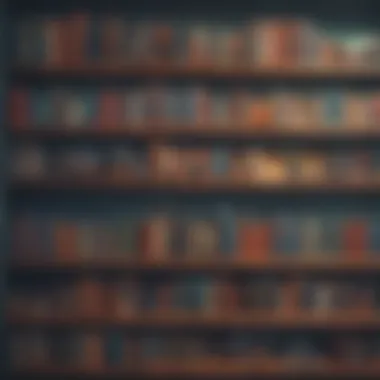Books to Engage Your Mind When You're Bored


Intro
Boredom can creep in unexpectedly, leaving you searching for something to spark your interest. Whether you’re stuck on a long commute, waiting in a queue, or simply lying on the couch with nothing to do, reaching for a good book can be a perfect way to pass the time. Books have a unique ability to transport us to different worlds, challenge our thinking, and broaden our perspectives. This article aims to introduce a variety of engaging reads that can alleviate dull moments and offer fulfilling experiences through different genres.
Reading isn't just a distraction; it can be one of the most enriching activities one can undertake. With both fiction and self-help books on our radar, we’ll dig into specific categories that cater to a wide spectrum of tastes.
The idea is not just to fill spaces of time, but to also provide food for thought and opportunities for personal growth, blending entertainment with self-improvement in a satisfying way.
Book Categories
Books can be categorized based on various criteria like genre, themes, and their potential impact. Here, we explore two main categories that can effectively combat boredom: Fiction and Literature, and Self-Help and Personal Development.
Fiction and Literature
Fiction often provides an escape from reality. It's like diving headfirst into a pool of creativity and imagination. The narratives can whisk you away on grand adventures or let you witness emotional journeys of characters who seem all too real. Here are some genres to consider:
- Mystery/Thriller: Books that keep you on the edge of your seat, unraveling clues until the final reveal.
- Fantasy: Immerse yourself in realms that defy logic; where magic reigns and mythical creatures roam.
- Literary Fiction: Thought-provoking stories that capture the essence of the human condition, inviting deep reflection.
- Sci-Fi: Explore futuristic concepts and the potential consequences of technological advancements.
Self-Help and Personal Development
For those in search of practical solutions, self-help books offer valuable insights and strategies for navigating life's complexities. They can act as a roadmap for personal and professional growth. Focus areas might include:
- Mental health and well-being: Tips to cultivate a positive mindset and resilience.
- Productivity: Methods to improve efficiency and time management.
- Relationships: Advice on building and nurturing healthy connections.
- Financial literacy: Understanding money and investments to build a secure future.
Book Summaries
Key Insights and Takeaways
When picking a book, it’s useful to understand the core ideas or themes presented. Here’s what you can expect:
- Diverse Perspectives: Literature can present viewpoints outside one’s own experience, prompting reflections that enhance empathy and understanding.
- Life Lessons: Many self-help texts distill wisdom into actionable insights that encourage you to make favorable changes in your life.
- Cultural Understandings: Fiction often presents a cultural landscape, giving readers a taste of traditions and lifestyles different from their own.
How to Apply the Lessons
Integrating these insights into everyday life is just as important as consuming them. Here’s how:
- Reflect: Spend a few minutes after each chapter considering the characters’ decisions or advice in self-help books.
- Engage with the Material: Take notes, highlight passages, or even discuss them with friends to draw deeper meaning.
- Experiment: Implement suggestions from self-help books in small, manageable doses to avoid feeling overwhelmed.
"Reading gives us some place to go when we have to stay where we are." - Mason Cooley
The right book might just be the key to unlocking new ideas and perspectives in your life.
The Role of Literature in Alleviating Boredom
Literature has this unique power, doesn’t it? In a world where monotony can sneak into our lives, books offer a lifeline. They provide not just an outlet for escape but also a means to expand one’s understanding of both self and the world around us. The act of reading engages our minds in a way that few other activities can. When boredom strikes, many might reach for their phones or turn on the television, but books have a deeper resonance. They immerse us in alternate realities and provide a chance to contemplate thoughts and ideas that we often overlook.
Understanding Boredom and Its Causes
Boredom isn’t merely a fleeting feeling; it’s a complex emotional state. It can stem from sameness in daily routines, lack of stimulation, or even a sense of disconnection from the environment. Imagine being stuck in traffic, with your mind wandering to uncharted territories. You might feel that itch to break free from that monotonous moment. Identifying what causes boredom is the first step in alleviating it. Perhaps you’re exhausted from repetitive tasks, or maybe it’s a craving for creative expression that sits unaddressed.
How Books Provide an Escape
Books work like a portal, transporting us to lands unknown or revisiting historical events that shape our understanding of existence. Reading allows us to transcend our immediate circumstances. For instance, in a gripping thriller, you might find yourself racing against time alongside the protagonist, forgetting for a moment the mundane tasks waiting back home. A well-crafted story can lead us to discover new perspectives, ask difficult questions, and dive into emotions we rarely acknowledge.
"Reading is a way to escape the ordinary, giving us glimpses of lives we may never lead, but can experience vicariously."
The Psychological Benefits of Reading
Engaging with a book has proven psychological advantages. When one reads, the mind is actively engaged, enhancing cognitive function and keeping thoughts sharp. Studies show that reading lowers stress, providing a much-needed respite in today’s fast-paced world. Furthermore, it encourages empathy by allowing us to step into others' shoes, fostering a deeper connection with humanity. The transient escape of a book can pave the way for introspection, helping alleviate feelings of isolation and promoting overall mental health.
In sum, literature serves as a multifaceted remedy for boredom, encouraging not just an escape but also a profound exploration of self and society.
Fiction: A Gateway to Imagination
Fiction serves as a powerful conduit through which readers can venture beyond the ordinary, unlocking realms of imagination and possibility. When boredom strikes, the beauty of fiction lies in its ability to transport readers to worlds where the mundane is transformed, and new ideas blossom. It stimulates creativity and invites individuals to see from different perspectives. Whether it’s the captivating hero’s journey or the intricate dance of relationships, fiction enables readers to engage deeply with narratives that resonate on both an emotional and intellectual level.
Classic Novels that Inspire
Classic novels remain timeless treasures that continue to spark inspiration long after their initial publication. Works such as "Pride and Prejudice" by Jane Austen or "1984" by George Orwell present us with complex characters navigating society's norms. Such narratives encourage us to ponder profound themes like love, power dynamics, and the human condition itself.
The beauty of classics is not just in their storylines; it’s also about their enduring relevance. They often hold a mirror to society, prompting reflections on morality and ethics. Furthermore, they come with rich language and style that enhances one's appreciation for literary craft. Reading classics isn't merely an escape; it's an encounter with ideas that can ignite one's thinking and challenge one’s assumptions.
Contemporary Fiction to Dive Into
Contemporary fiction offers a plethora of fresh narratives that resonate with modern readers. Authors like Chimamanda Ngozi Adichie and Haruki Murakami weave together relatable themes with contemporary dilemmas. Their stories touch on identity, globalization, and the quest for meaning in an increasingly complex world.
Engaging with contemporary fiction can be a way to forge connections with the present. It brings forth diverse voices and experiences that may not align with mainstream perceptions. These stories often include unlikely protagonists who deal with real-life issues, making them not only relevant but also essential reading for those seeking to understand the nuances of today’s society.


Science Fiction: Where Boundaries Fade
Science fiction is perhaps the genre most adept at pushing boundaries. It allows readers to explore the extraordinary possibilities of our universe—from advanced technology to alien civilizations. Authors like Isaac Asimov and Philip K. Dick challenge the laws of reality and hint at the future we might one day inhabit.
What makes science fiction compelling is its blend of speculation and current societal concerns. It has the power to question our ethics regarding technology, explore climate change possibilities, or examine the essence of humanity itself. Moreover, it stimulates imagination by introducing concepts like time travel or artificial intelligence, urging readers to ponder questions that extend beyond the confines of our current understanding.
"Science fiction is not about the future, but a reflection of our present through the lens of possibility."
Engaging with fiction, whether classic or contemporary, or even diving into science fiction, opens a treasure trove of insights and experiences, making it a valuable antidote for the boredom that sometimes creeps in. As you explore these layers of narratives, you’ll find that every page turned can lead to deeper understanding, broadening horizons and nourishing your intellect.
Non-Fiction: Learning Through Pages
Non-fiction holds a notable position in the realm of literature, particularly when it comes to breaking the monotony of boredom. Unlike fictional works, which transport readers into alternate realities, non-fiction provides a grounding experience, steeped in factual information and real-life stories. Reading non-fiction can be a fruitful venture, offering insights into various subjects while also fostering personal development. As we navigate through the world of non-fiction, we encounter a treasure trove of knowledge that not only enlightens us but also challenges our perspectives.
Books classified under non-fiction come in diverse flavors—biographies, self-help, and historical accounts among others. This eclectic mix serves a dual purpose: it educates and entertains. Grasping the significance of non-fiction in combating boredom allows readers to see it as a powerful tool, unlocking an understanding of the world and its multifaceted intricacies.
Biographies that Captivate
Biographies draw us in by unveiling the lives of remarkable individuals. They offer a lens through which we can understand the complexities of human experience. For instance, "The Diary of a Young Girl" by Anne Frank resonates deeply with many. It captures the trials of a young girl hiding from persecution during WWII, allowing readers to empathize profoundly.
On the other hand, “Steve Jobs” by Walter Isaacson paints a picture of innovation and resilience. By recounting the life of the tech visionary, readers can learn about creativity, leadership, and the art of perseverance. Biographies not only chronicle significant events but also dive into the internal landscapes of their subjects, making them relatable and inspiring.
- Key Benefits of Reading Biographies:
- Gain insights into historical contexts.
- Understand the human capacity for growth and failure.
- Develop empathy through shared experiences.
Self-Help Books for Personal Growth
In a world often rife with challenges, self-help books stand as beacons of guidance. Titles like "Atomic Habits" by James Clear provide practical strategies for habit formation, making personal change accessible. Not only do these books equip us with tools for improvement, they also remind us that struggling is part of the human experience.
Moreover, “The Power of Now” by Eckhart Tolle shifts focus to mindfulness, urging readers to be present. This can lead to profound changes in one's perception of life’s challenges and mundane moments, steering us away from boredom towards a life filled with purpose and insight.
- Advantages of Self-Help Reading:
- Offers actionable advice for real-life application.
- Encourages self-reflection and awareness.
- Helps establish resilience against life's hurdles.
Historical Accounts that Educate
Historical non-fiction broadens our understanding of the past, revealing the underlying narratives that shaped the world today. Books like "Sapiens: A Brief History of Humankind" by Yuval Noah Harari challenge preconceived notions about human history, merging anthropology with enlightening storytelling. Harari’s work compels readers to reevaluate their place in the grand tapestry of existence.
Additionally, “The Devil in the White City” by Erik Larson intertwines the story of the 1893 World’s Fair with the chilling narrative of a serial killer in Chicago. This blend of history, mystery, and suspense captivates readers while showcasing the fascinating events of that era, making history come alive.
- Benefits of Historical Reading:
- Fosters critical thinking about current societal issues.
- Inspires a deeper appreciation for cultural heritage.
- Offers lessons from the past that can illuminate the future.
Ultimately, diving into non-fiction is a brilliant strategy to combat boredom. By choosing books that captivate, inspire, and educate, readers can embark on a journey of discovery that is enriching at its core. Just like a well-crafted roadmap, non-fiction guides us through the complexities of life, providing not only amusement but also substantial nourishment for the mind.
Poetry: The Art of Concise Expression
Poetry holds a unique position in literature, often defined by its ability to convey profound emotions and ideas in a compact form. It distills human experience into verses that resonate in ways that few other forms can match. While novels allow for expansive narratives and character development, poetry strips down complexities to the bone, transforming them into impactful lines that stick with you long after the page is turned.
Reading poetry can be especially beneficial when boredom looms, as it invites you to engage with language and rhythm in a new light. Each poem, in its brevity, encapsulates a universe of thought, challenging the reader to ponder deeper meanings and emotions. It offers a canvas for diverse interpretations, making the experience personal to each reader.
A noteworthy aspect of poetry is its accessibility. A single poem can be read in a few minutes, making it a perfect choice for those moments when time is short but the mind seeks stimulation. Plus, poetry often employs vivid imagery, figurative language, and innovative structures that can ignite creativity.
"Poetry is when an emotion has found its thought and the thought has found words." – Robert Frost
Modern Poets to Explore
Exploring modern poetry opens a door to a fresh realm of voices that react to contemporary themes and societal issues. Here are some poets worth your time:
- Mary Oliver – Known for her keen observations of nature and its connection to human experiences, her poems celebrate the little things in life with simplicity and beauty.
- Rupi Kaur – A voice that speaks to a younger generation, Kaur's work delves into themes of love, loss, and identity, often accompanied by charming handmade illustrations.
- Ocean Vuong – With a lyrical style that blends personal narrative with universal themes, Vuong's poetry touches on cultural heritage, sexuality, and memory.
This selection of poets encapsulates the current landscape of poetry, offering pieces that are emotional, thought-provoking, and relatable. Their work shows how poetry can bridge the gap between the personal and the political, making it a thought-provoking read during dull times.
Classic Poetry that Resonates
Classic poetry endures because it taps into fundamental aspects of human experience, transcending time and cultural boundaries. Reading the works of poets from the past reminds us that while the world changes, certain feelings and encounters remain timeless. Here are a few classic poets and their notable works that continue to resonate:
- Emily Dickinson – Often exploring themes of death and immortality, Dickinson's unique style and poignant themes invite readers to reflect on their own existence.
- Robert Frost – His often pastoral poetry offers insights into human nature and the complexities of life through relatable imagery and language.
- T.S. Eliot – A master of modernism, Eliot's works challenge readers to grapple with intricate ideas about tradition, culture, and personal dislocation.
Reading poetry from these classic authors can provide a sense of connection to humanity’s shared journeys and struggles. Their words have stood the test of time and continue to touch readers, making them exemplary choices in moments of boredom.
Fantasy and Adventure: Realms Beyond Reality
In the vast landscape of literature, fantasy and adventure shine like beacons for those seeking more than just a story. These genres provide an unparalleled escape from the mundane, transporting readers into worlds brimming with magic, mythical creatures, and epic quests. This is not just about turning pages; it’s about engaging with the imagination and exploring possibilities far removed from everyday life.
At the core of fantasy and adventure lies the freedom to dream. These narratives allow us to step beyond the bounds of reality, igniting our creativity and offering new perspectives. Through vivid storytelling, readers encounter challenges and triumphs that might not occur in their own lives, fostering a sense of bravery and resilience. In times of boredom, immersing oneself in these realms can lead to renewed inspiration and passion.


Epic Series for Extended Engagement
When considering the best way to dive into fantasy, epic series stand out as remarkable choices. These multi-volume tales form intricate tapestries woven with rich characters, complex relationships, and expansive landscapes. Think of The Wheel of Time series by Robert Jordan or A Song of Ice and Fire by George R.R. Martin. These narratives unfold slowly, revealing layers of intrigue and adventure that keep the reader coming back for more.
Engaging with an epic series allows readers to spend significant time with beloved characters, making each victory feel personal and each setback profoundly impactful. The sheer length and depth of these stories create a sense of belonging, almost like returning to an old friend with every new book.
- Character Development: The richness of these tales often leads to significant character growth. Readers see characters evolve through challenges, allowing them to reflect on their own journeys.
- World-Building: Exceptional world-building invites readers to explore diverse cultures, histories, and social structures, fostering a sense of wonder and curiosity.
- Community: Many fans of epic series connect over shared experiences, sparking discussions on forums or social media platforms such as reddit.com and facebook.com.
Here’s a look at a few epic fantasy series worth your time:
- The Malazan Book of the Fallen by Steven Erikson
- Mistborn Trilogy by Brandon Sanderson
- The Stormlight Archive also by Brandon Sanderson
- The Earthsea Cycle by Ursula K. Le Guin
Embedding ourselves in these series, readers naturally stave off boredom while fostering a deeper understanding of loyalty, sacrifice, and hope.
Young Adult Fantasy that Captures the Heart
The young adult fantasy space caters to a unique audience, seamlessly blending relatable themes with extraordinary plots. These stories resonate with youth yet offer substantial depth for readers of all ages, creating a universal appeal. Titles such as Harry Potter by J.K. Rowling and The Hunger Games by Suzanne Collins grapple with themes of identity, rebellion, and the quest for freedom.
Young adult fantasy serves not just as entertainment but as a mirror to real-life struggles faced by teens and young adults. The struggles with friendship, love, and self-discovery are wrapped within fantastical adventures that resonate with the heart. The emotional connection readers develop with protagonists is pivotal; each challenge faced becomes a part of their own learning experience.
For those diving into this genre, here are a few noteworthy series to consider:
- Percy Jackson & The Olympians by Rick Riordan
- Daughter of Smoke and Bone by Laini Taylor
- The Grisha Trilogy by Leigh Bardugo
By exploring young adult fantasy, readers not only combat boredom but also cultivate empathy and understanding, nurturing a sense of community with those who share similar experiences.
"Reading gives us someplace to go when we have to stay where we are." – Mason Cooley
Fantasy and adventure are not merely modes of escape; they are pathways to personal growth and discovery. Engaging with these narratives sparks the imagination, enriches our worldview, and oftentimes, inspires a deeper connection to life's perpetual quests.
Short Stories: Quick Escapes
Short stories offer a unique charm that can serve as a perfect antidote to boredom. In a world where attention spans can sometimes be shorter than a sneeze, a brief foray into a compact narrative can revitalize the spirit. Unlike novels, which demand an investment of time and emotional energy, short stories afford readers the luxury of finishing a tale in one sitting. This immediacy can satisfy a craving for storytelling without the often overwhelming commitment of longer texts.
The appeal of short stories especially lies in their ability to encapsulate complex emotions and vivid imagery in just a handful of pages. One might say they are like espresso shots of literature, providing a quick jolt of inspiration or reflection. Each story can launch readers into diverse worlds without requiring months of dedication. Here are a few specific benefits of indulging in short stories:
- Concise and Impactful: Authors can distill their ideas and emotions efficiently, often leading to surprising conclusions or thought-provoking twists.
- Variety of Styles: One can explore a multitude of voices and styles in a single sitting. This diversity can keep the reading experience fresh and engaging, allowing for quick adaptations to the reader's mood.
- Accessible to All: Short stories can appeal to all ages and interests. Whether it’s classic fairy tales, modern fables, or gritty urban narratives, they cater to a broad audience.
Readers should also consider how short stories can serve as gateways to discovering new authors or genres. Finding a single story that captivates can spark intrigue for an entire collection or even an author’s body of work, creating a domino effect of literary exploration.
"Short stories are like snapshots of life, revealing the mundane and the extraordinary in a blink of an eye."
Collections Worth Your Time
In the realm of short stories, collections combine multiple tales by a single author or thematic anthology. This format can provide an enriching experience, where each narrative greets the reader with its own unique personality, yet often resonates with a shared motif. Some standout collections include:
- "Tenth of December" by George Saunders: A provocative mix of dark humor and poignant observation, it showcases human experiences in extraordinary situations.
- "Interpreter of Maladies" by Jhumpa Lahiri: Delving into the lives of Indian immigrants in America, these stories explore love, longing, and the intricacies of cultural identity.
- "The Things They Carried" by Tim O’Brien: A powerful collection that blurs the lines between fiction and memoir, bringing the Vietnam War experience into focus with emotional depth.
The structure of collections can often mirror an excavation; as you delve deeper, hidden themes and motifs begin to materialize. Each story adds another layer to the reader's understanding while simultaneously standing robustly alone.
Anthologies Across Diverse Voices
Anthologies elevate the discussion to a broader spectrum by collecting stories from various authors, often showcasing contrasting styles and perspectives. This amalgamation not only champions diversity but also highlights the nuances within different cultural narratives. Benefits of reading anthologies include:
- Cultural Exposure: Readers can get a taste of different cultural backgrounds, connecting with experiences that may be vastly different from their own.
- Emerging Voices: Anthologies often feature new or lesser-known writers, giving readers a fresh take on storytelling while broadening their literary horizons.
- Thematic Exploration: Many anthologies center around specific themes—whether it be love, loss, or social justice—inviting discussions on significant topics in a digestible format.
Some notable anthologies to consider:
- "The New Yorker: The Fiction Issue" – A collection of diverse narratives from renowned contemporary writers that pull readers into their unique worlds.
- "The Best American Short Stories" series – An annual collection that gathers remarkable short stories from various esteemed publications.
- "Women on Nature" edited by Aimee Nezhukumatathil – An anthology that includes perspectives on nature from an array of women authors, enlightening readers about heartfelt connections to the environment.
In summary, sections focusing on short stories encompass a vast landscape of literary exploration. From collections that channel a single author’s brilliance to anthologies that celebrate diverse voices, there’s no shortage of material to engage with. These quick escapes not only entertain but can also serve as conduits for deeper reflection and understanding.
Engaging with Difficult Texts
In a world buzzing with instant gratification and bite-sized information, diving into difficult texts might seem like a daunting task. Yet, this very challenge can be the key to unlocking a wealth of knowledge and understanding. Engaging with complex literature demands not just attention, but a willingness to wrestle with ideas, themes, and challenging language. Such engagement fosters critical thinking, cultivates patience, and ultimately transforms boredom into enlightenment.
Excitingly, engaging with difficult texts often brings rewards that echo beyond the classroom. One starts seeing connections between the text and their own life experiences, as well as broader societal issues. The process is not merely about trudging through dense prose; it’s about exploration and discovery. As readers grapple with intricate narratives, they develop a richer understanding of the human experience.
Challenging Reads for Intellectual Stimulation
Challenging literature can take many forms—from dense philosophical works to experimental fiction that flirts with the boundaries of narrative structure. These books ask the reader to think deeply, pause often, and sometimes even revisit passages to grasp the nuances of the argument or narrative.
Examples of such texts could include:
- "Finnegans Wake" by James Joyce – A challenging read that rewards those who dive into its depths, offering layers of meaning through its unique language.
- "The Brothers Karamazov" by Fyodor Dostoevsky – This book delves into ethical dilemmas and existential struggles, forcing readers to confront their own beliefs.
- "Gravity's Rainbow" by Thomas Pynchon – A complex structure and rich detail prompt curiosity and engagement, making it a rewarding effort.
The beauty of these texts lies in their ability to act as intellectual gymnasiums. They require effort to navigate but develop muscles of understanding and critique that benefit the reader's overall cognitive skills.


Literary Criticism that Provokes Thought
Literary criticism offers a lens through which we can analyze texts, scrutinize themes, and explore the societal context in which literature is produced. Engaging with criticism allows readers to challenge their own interpretations and to see how others articulate their thoughts about literature.
For instance, works by critics such as Roland Barthes or Edward Said encourage examining texts not just as standalone works but as reflections of the time, culture, and personal experiences surrounding their creation. This critical perspective leads to a richer understanding of literature and its implications.
Books such as:
- "Literary Theory: An Introduction" by Terry Eagleton – This book provides a comprehensive overview of critical frameworks, equipping readers to dissect and discuss literary texts more effectively.
- "Culture and Imperialism" by Edward Said – A potent mix of literary analysis and post-colonial thought, it invites readers to reimagine classics through modern eyes.
Engaging with literary criticism can initially seem perplexing, but it enhances one’s appreciation for literature and its broader social implications. Such studies do not just inform a reader’s understanding but transform it into a lively debate between texts, cultures, and ideas, propelling boredom far into the rearview mirror.
Reading Recommendations for Diverse Audiences
In our quest to fend off boredom, reading can be a true lifesaver. This section dives into the various reading recommendations tailored for different groups. From students chasing knowledge to professionals honing their skills, and casual readers kicking back, there's something on these shelves for everyone. The goal here is to bridge the gap between interests and opportunities to learn. Each demographic has unique needs, and understanding these nuances makes for more enriching reading experiences.
Books for Students and Lifelong Learners
For students and lifelong learners, books can play a pivotal role in expanding horizons. Think of it like feeding the mind; the more you nourish it, the more it grows. Texts that challenge the mind not only get the neuron-firing but also cultivate critical thinking. A few recommendations might include:
- "The Power of Habit" by Charles Duhigg – This book delves into how habits form, offering insights that can improve both personal and academic life.
- "Thinking, Fast and Slow" by Daniel Kahneman – A great read that encourages deeper thought about our decision-making processes.
- "Educated" by Tara Westover – A compelling memoir depicting the power of education against all odds, it’s inspiring for anyone, particularly those in academic settings.
For a solid study session, consider titles that are thought-provoking and rich in substance. Having a good mix of genres ensures varied perspectives.
Literature for Professionals and Educators
Professionals and educators also need their fair share of stimulating reads. Whether it’s to gain insight into innovative practices, or simply to recharge creatively, literature suited for this group can spark ideas and refresh mindsets. Here are notable picks:
- "Dare to Lead" by Brené Brown – This one is particularly relevant for those in leadership roles, offering tools to foster more empowering workplaces.
- "Deep Work" by Cal Newport – A blueprint for enhancing productivity, it speaks to anyone looking to improve their focus.
- "The Innovator’s Dilemma" by Clayton Christensen – Essential reading for anyone in business, this book provides critical insight into disruptive technology and innovation.
"Reading is a means of personal discovery and reflection, creating a space for professionals to explore new ideas and methodologies."
Guidance for Casual Readers
Finally, casual readers often look for compelling stories that allow them to escape the mundane without diving too deep into complexities. These are the reads that can easily fit into any lifestyle, making them perfect for brief moments of downtime. Recommendations include:
- "The Alchemist" by Paulo Coelho – A philosophical tale about pursuing one's dreams, it's both accessible and enriching.
- "Eleanor Oliphant Is Completely Fine" by Gail Honeyman – A touching story with humor and heart. Casual yet impactful.
- "The Night Circus" by Erin Morgenstern – A fantasy that captivates the imagination, perfect for a leisurely read.
To sum it up, whether for academic growth, professional insights, or light escape, the right book can transform moments of boredom into opportunities for learning and discovery. By aligning specific recommendations with distinct groups, we can help foster a habit that not only combats boredom but enriches life itself.
The Future of Reading: Digital vs. Physical
The discourse surrounding the future of reading is gaining traction as the world increasingly shifts toward digital modalities. When boredom strikes, people are looking for quick and convenient ways to escape reality through literature, and this is where the methods of accessing this material come into play. It's crucial to understand the different facets—each having its pros and cons—of reading in our modern age, enhanced by technology and yet steeped in tradition.
E-books and Their Accessibility
In today’s fast-paced world, e-books have emerged as an essential tool for avid readers. Their convenience cannot be overstated. You can whip out a smartphone or tablet and instantly dive into a new story, with a collection of thousands of titles just a click away. Accessibility has never been easier; you can read on the bus, waiting at the doctor's office, or while sipping coffee at your favorite café. No need to lug around heavy tomes or flip through pages in a crowded space—everything you need is at your fingertips.
E-books level the playing field for readers from all walks of life, offering a plethora of options regardless of geographic or financial constraints.
Moreover, e-books often feature adjustable font sizes to accommodate varying eyesight conditions, and features like text-to-speech ensure that even those with disabilities can engage with literature. Additionally, platforms like Kindle or Apple Books keep a record of your last read, bookmarks, and notes, further enhancing the user experience.
However, the digital format does raise concerns regarding screen fatigue and the potential loss of the tactile experience many readers cherish.
The Lasting Appeal of Print
Despite the digital boom, print books have an enduring charm that e-books may struggle to replicate. There's something innately satisfying about holding a book, flipping its pages, and even the smell of the paper can evoke feelings of nostalgia and calm. For some, reading a physical book is akin to a ritual—a slower, deeper engagement with the text. The tactile sensations involved in a print book can make the journey through its pages feel more personal and intimate.
Another aspect worth pondering is the aesthetics of a physical library. Shelves filled with spines bearing the titles of beloved reads not only provide a sense of identity but also spark conversations. When books can be displayed, they become a gateway for relationships, connecting individuals through shared interests.
Unlike digital formats, print books are free from the concerns of digital rights management, loss of files, or the need for electronic devices. They are tangible, resilient, and can be shared, gifted, or even passed down through generations, imbued with personal significance.
While e-books cater to convenience, print books satisfy the deeper, more sentimental aspects of reading.
The End: The Endless Journey of Reading
Reading, at its core, is not merely a pastime; it's a continuous voyage into realms of knowledge, emotion, and creativity. This article has explored a diverse array of books designed to combat boredom, demonstrating how literature can be a refuge and a catalyst for personal development. In today's fast-paced world, where distractions abound, embracing the habit of reading can offer substantial rewards that extend beyond temporary enjoyment.
Embracing a Lifelong Habit
Incorporating reading into your daily routine can transform your outlook on life, providing a consistent source of inspiration and learning. By making it a habit, you not only mitigate the risk of boredom but also foster critical thinking and empathy. Start small—maybe twenty minutes with a novel on your commute or a few pages before bed. The key is consistency.
Additionally, setting specific goals can amplify the experience. Consider challenges like "reading a book a month" or exploring specific genres. This not only builds a sense of accomplishment but also exposes you to new ideas and perspectives. You'll discover diverse authors and narratives that challenge your views and engage your intellect.
Finding Balance in Diverse Genres
The beauty of literature resides in its vastness—you can explore countless genres tailored to your interests or mood. Perhaps you gravitate toward heartwarming fiction one day, and the next, you’re immersed in a thought-provoking biography. Balancing genres not only keeps things fresh but encourages a broader understanding of human experiences.
Engaging with different forms of literature fosters what some might call a "reading diet."
- Mixing fiction with non-fiction enhances your emotional intelligence alongside your factual knowledge.
- Incorporating poetry allows you to appreciate language's musicality, while short stories offer quick, powerful narratives ideal for busy lives.
- Exploring historical fiction can provide context to real events in an engrossing format.
By diversifying your reading choices, you create a rich tapestry of stories and insights. The trick is to remain open-minded and willing to explore unfamiliar terrains. After all, every book has the potential to resonate with you or teach you something valuable. Thus, the journey never ends, as every page turned opens the door to another adventure awaiting just around the corner.
"A reader lives a thousand lives before he dies. The man who never reads lives only one." - George R.R. Martin



